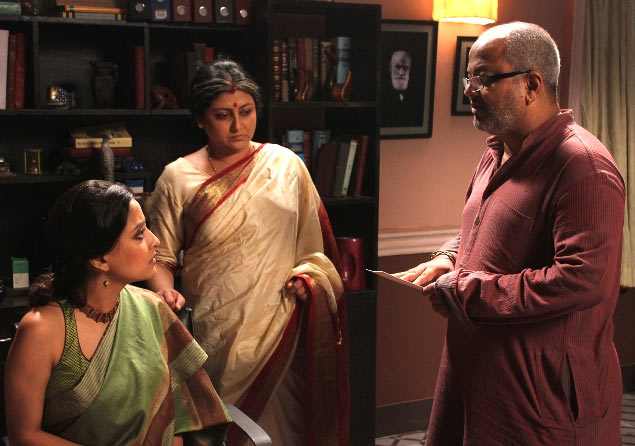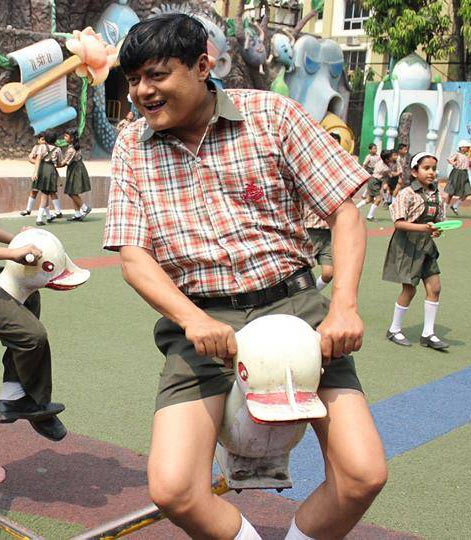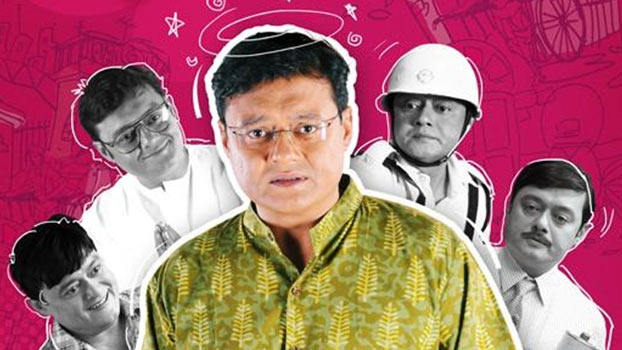 | « Back to article | Print this article |
'New kinds of films are being made in Bengali cinema'
'It is very difficult to recover the costs. Most producers depend on collection from halls plus television rights but there are only two channels that buy Bengali films.'
Rangan Chakravarty talks about the success of Bari Tar Bangla and the difficulties of making a film in Bengali.
Rangan Chakravarty is a name to reckon with in Bengal’s television and film industry.
His recent film Bari Tar Bangla has taken viewers by surprise for its content and near-perfect execution.
The film's title is inspired by a popular Sukumar Ray rhyme. It depicts (and at times lampoons) the journey of the Bangla language over the years.
Running to full houses for more than two consecutive weeks, Bari Tar Bangla has proved once again that Bengal’s film market is ready to lap up a production that is profound and witty, subtle yet bold.
During a conversation with rediff.com’s Indrani Roy, Chakravarty analysed his film and shared his experiences as a filmmaker.
What led to the making of Bari Tar Bangla?
It’s difficult to say what actually motivated me.
I am a professional writer. I have been writing in Bengali and English for advertising, newspapers, television and films for nearly 40 years.
I think the film reflects some of the concerns I feel for the plight of the Bengali language.
The film has been running to full houses in Kolkata, we hear. Does that mean you will make profits?
Not unless it runs to full houses for eight weeks or more.
The film is running in about 20 halls. The number is too little for us to make profits.
It’s said that the economy of the Bengali film industry is rather weird. Do you agree?
Yes. I am a newcomer. This is my second film and the first film that our company has produced.
It is very difficult to recover the costs. Most producers depend on collection from halls plus television rights.
There are only two channels that buy Bengali films.
Therefore, unless a film is a major blockbuster, which runs in 200 halls, it is difficult to recover the costs.
Please click Next to see more
'The film does not deal with the political situation of Bengal in any detail'
Some critics and movie buffs are surprised that this film escaped the censor board’s ‘scissors’. Your comments.
I am not that surprised. In fact, the censor board members congratulated me after the screening.
That was the first time I felt that people are going to like this one.
I did not know any of the members on the board; their reaction was spontaneous.
You have been a Leftist to the core. Is the film based on your own experiences? Does your heart still mourn for the plight of the Leftists in India?
Yes and no. I was born into a Leftist family and was almost a natural Leftist. But I do not believe in the strategic ideology of Marxism any more.
I think some of its economic insights are valid and important but the whole political structure that had been built on them is wrong.
However, there is a lot of oppression and injustice in the world and communism brought together some of the best people who wanted to right the wrongs.
I have great love and respect for those people. And in that way, I am a Leftist. But I do not have much love left for the organised Left in India.
The film was a home production. Why couldn’t you get a producer?
I made a film in 2008, Bor Ashbe Ekhuni. The film did not do brilliantly at the box office, but it is still shown regularly on a local television channel, Zee Bangla.
Therefore, it is obvious that there is a steady viewership for the film.
But strangely, for six long years after BAE, I did not get a producer for any of my concepts.
In fact, we ran out of money after producing this film and had to wait for a year till Raima (Sen, actress) Bari Tar Banglae referred us to Satrajit Sen of Tripod Entertainment.
He took the initiative and got the film released through Reproduction Entertainment Private Limited.
Perhaps, the vulnerability of the Bengali film market makes investors cagey.
Does your film deal with the political realities of the state of West Bengal and its two main political parties?
Not really. The film does not deal with the political situation of Bengal in any detail.
It is a film about the journey of a language and its use by varied political formations. Cultural theory looks at a language as a battlefield wherein various social groups fight for supremacy.
Language often becomes a weapon in the hands of those who exercise power.
In Bengal, we have a particularly long history of such battles.
The nationalist intelligentsia approached the British to ban vulgar songs that belonged to the urban subaltern groups.
The Left in the state has also traditionally used the refined language created during the nationalist supremacist movement.
When the Trinamool (Congress) came to power, it too challenged the hegemony of this language.
The film does not take any sides but attempts to trace the journey of our mother tongue.
'Linking filmmakers with their advertising background is rather overplayed'
You now stay in Mumbai mostly. Isn’t there enough work in Kolkata?
No. This is true for me and my business partner.
We have been television producers for 12 long years. But now, we don’t get work in Kolkata.
We have been forced to close our office and take up retainer jobs in Mumbai.
Bengali films of late have become really smart. Many new directors are making films on hitherto unheard-of subjects.
Yes. I think new kinds of films are being made. The quality of production has improved as well.
It’s a surprise for me that my film is actually running better in multiplexes where people have to pay quite a lot.
You belong to that league of new directors who hail from the ad world. Does it help professionally?
Linking filmmakers with their advertising background is rather overplayed.
It is possibly true that a lot of people who want to make films but cannot, land up in advertising in the beginning of their careers and turn to filmmaking at a later stage.
I was not really an ad filmmaker. I was a creative director in ad agencies, and I still am.
It could be that exposure to advertising gives us some proficiency in communications. However, it is wrong to assume that such an exposure makes a film slick and smart.
People tend to forget that Satyajit Ray also came from the advertising world. Does his Pather Panchali smack of commercials?
You have been writing songs regularly. What motivated that?
I love rhymes and have a penchant for playing with words. I think I am only good at writing songs that are funny or heavy in content.
In this film, the romantic song is written by my friend Sunandan Chakrabarty.
I had written songs for a few films earlier. In fact, I won a Bengal Film Journalists' Association Award for lyrics for a song for Patal Ghar.
I have written dozens of songs for our television programmes. I am a professional writer, I write whatever I am asked to.
What other films do you want to make?
I don’t know, really. The debacle in our television production business has rendered us penniless at the moment.
I need to keep my job in Mumbai to survive. I am 57 years old and it is not nice not to have any savings.
I have a script ready on a modern Goopi Gyne Bagha Byne. Two years ago, a producer had shown interest and we had gone up to the pre-shoot stage. But then the project got cancelled.
I would love to do that film. I have a few other scripts ready as well.
But where are the producers?


